Just In
- 1 hr ago

- 3 hrs ago

- 6 hrs ago

- 10 hrs ago

Don't Miss
- News
 Food Vlogger's Blue Ghee Rice Recipe Goes Viral, Will You Try It?
Food Vlogger's Blue Ghee Rice Recipe Goes Viral, Will You Try It? - Automobiles
 Ford Territory SUV Name Trademarked – Likely To Be Positioned Below The Everest SUV
Ford Territory SUV Name Trademarked – Likely To Be Positioned Below The Everest SUV - Finance
 IRFC, RVNL, IRCTC, Railtel: Railway Stocks In Focus As Election Polls Begin; Mega Rs 10-12 Lakh Crore Plan
IRFC, RVNL, IRCTC, Railtel: Railway Stocks In Focus As Election Polls Begin; Mega Rs 10-12 Lakh Crore Plan - Sports
 Al Nassr vs Al Fayha Live Streaming: Where to Watch Cristiano Ronaldo Saudi Pro League Match in India, UK, USA and Other Countries?
Al Nassr vs Al Fayha Live Streaming: Where to Watch Cristiano Ronaldo Saudi Pro League Match in India, UK, USA and Other Countries? - Technology
 OnePlus Ace 3 Pro Leak Hints at New Design; Expected Launch, Specifications We Know So Far
OnePlus Ace 3 Pro Leak Hints at New Design; Expected Launch, Specifications We Know So Far - Movies
 Coachella: AP Dhillon's Tribute To Sidhu Moosewala Goes Viral Amid Guitar Controversy, Fans REACT To VIDEO
Coachella: AP Dhillon's Tribute To Sidhu Moosewala Goes Viral Amid Guitar Controversy, Fans REACT To VIDEO - Travel
 Journey From Delhi To Ooty: Top Transport Options And Attractions
Journey From Delhi To Ooty: Top Transport Options And Attractions - Education
 IIIT-Bangalore Introduces PG Diploma In Digital Product Design And Management
IIIT-Bangalore Introduces PG Diploma In Digital Product Design And Management
Important Things To Know About Twin Pregnancy
Pregnancy is a wonderful gift. And when you find out that you are going to be the mother of twins, the joy is double fold. The news that you are going to have twins is always greeted with excitement and happiness.
But it is only later that it strikes to one that twins also mean double the duties and double the responsibilities.
It is not just the duties and responsibilities that the parents will have to face that one often overlooks. The couples also ignore other important factors of a twin pregnancy.
It is thought that twin pregnancy is just like a normal pregnancy and that it is not very different from being pregnant with a single child. In many ways, that thinking so proves wrong.

The needs of the pregnant woman are increased with a twin pregnancy. The risks involved in such pregnancies are more too.
It is said that more than 3 out of every 100 pregnancies end up being a twin pregnancy. This statistics is on the rise with more and more twins being born each year.
With this in mind, let us take a look at the things that you probably don't know about twin pregnancies.

Age Is A Factor When It Comes To Being Pregnant With Twins
Pregnancy is very much dependent on factors like age. Most doctors tell you that once you cross the 30 to 40 years of age mark, it gets difficult to conceive. Ironically, the chances of having a twin pregnancy also increases as you get older than 30 or 40. This is due to the fact that with age, the ovulation becomes erratic. You can ovulate with two follicles in the same cycles. If fertilization takes place, you will have a twin pregnancy, that too naturally!

Increased Requirement Of Folic Acid
Pregnant women are asked to take folic acid pills to help prevent birth defects like spina bifida. When a twin pregnancy is involved, the doctor will ask you to consume more folic acid when compared to a woman who is pregnant with a single baby. A mother-to-be who is pregnant with a single baby will be asked to consume 0.4 milligrams of folic acid in a day, whereas a woman with a twin pregnancy can be asked to have up to 1 milligram of folic acid in a day.
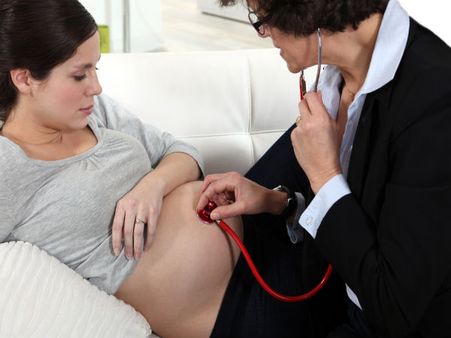
You Will Have To Deal With More Examination And More Testing Duration
Your doctor will take more time in examining you when you go in for your checkup. An ultrasound will also take much longer than it would to take a look at a single baby. But with this comes an extra risk too. The risk of miscarriage increases in twin pregnancies when the procedure known as amniocentesis is done.

You Will Have To Deal With A Much Worse Morning Sickness
Morning sickness in pregnant woman is caused by the hormone known as the Human Chorionic Gonadotropin hormone. With twin pregnancies, the levels of the HCG are doubled and hence, the morning sickness will be of a much more intense one. Other problems associated with pregnancy like bloating, back ache and heartburn will increase.

Increased Postpartum Bleeding
It is a common myth that giving birth to one baby is the same as it is giving birth to twins. The mother with twins is also more likely to bleed after birth when compared to those with single birth. They also have a predilection to heavy bleeding after the children are born. Complications during the child birth also increase.

Spotting Can Be Common In Twin Pregnancy
Spotting is often seen as a sign of miscarriage, especially in the first trimester. But when you are pregnant with twins or multiples, spotting is commonly seen. Spotting with cramping is still a cause of worry and should be immediately brought to the doctor's notice. Other points that should raise an alarm are passing of clots and bleeding. If you only experience some spotting without the presence of cramping, there is no need for panic.
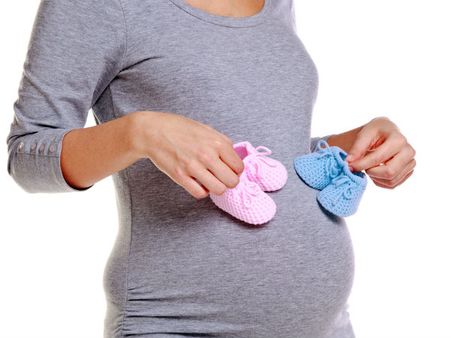
Fetal Movements Can Be Just The Same As With Single Pregnancies
You might expect to feel your babies move earlier than in single pregnancies as you are carrying two babies, but that is not the case. In most pregnancies, single or otherwise, the fetal movements can be felt by 18 to 20 weeks.

Twin Pregnancies Can Cause More Weight Gain
It is only natural that with two babies, two placentas, more amniotic fluid, the mother-to-be gains more weight than in a single pregnancy. The energy required to sustain two pregnancies are more too. Ideally, a mother-to-be must gain around 12 kilograms. In a twin pregnancy, the pregnant woman must gain around 15 kg. The weight gain should not be less than 7 kilograms and must not exceed 18 kilograms for the pregnancy to be healthy and uneventful.
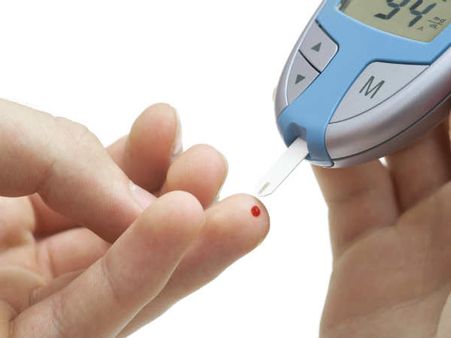
The Risk Of Developing Gestational Diabetes Is More In Twin Pregnancies
It is seen that the women who are carrying twins are more likely to develop gestational diabetes than a woman with a single baby. But the risks that come with gestational diabetes are lesser in the case of twins, as the babies are rarely larger than normal and can often be delivered through natural birth.
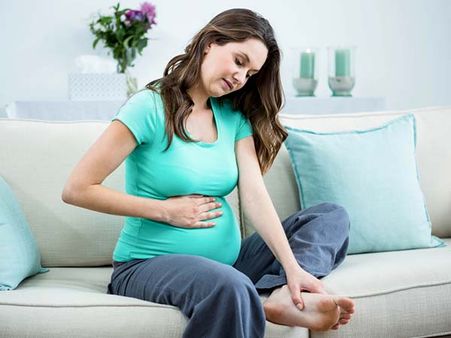
A Mother Carrying Twins Is More Likely To Have Preeclampsia
While the reason for preeclampsia is not clear, it is very commonly seen in women with a twin pregnancy. The characteristic symptoms of preeclampsia are swollen limbs, high blood pressure and the presence of protein in the urine of the pregnant mother. If not treated or observed carefully, the condition can lead to a serious and fatal end.
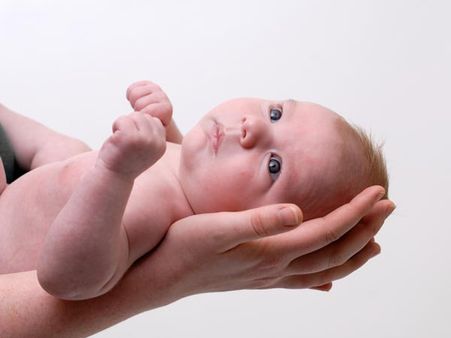
Premature Birth Is Common With Twins
While single mothers normally have their labour at 40 weeks, mothers with twins can go into labour as early as 36 weeks. If the babies are delivered before the 34-week mark, they may have to deal with the complications of pre-term birth. They can also have respiratory problems. The babies can also have a low birth weight. Bed rest and medications to prolong the gestational period can be prescribed by your doctor, but the babies can still arrive earlier than their due date.

Women With Twins Are More Likely To Deliver Via A C-Section
Natural births are more preferred and are the most common method of delivery. When pregnant with twins; however, C-section might be the way to go. This is more likely when one or both babies are in a breach position.
-
 healthSolar Eclipse 2024: Dos and Don'ts for Pregnant Women During Surya Grahan
healthSolar Eclipse 2024: Dos and Don'ts for Pregnant Women During Surya Grahan -
 healthLunar Eclipse 2024: Dos And Don'ts For Pregnant Woman During Chandra Grahan
healthLunar Eclipse 2024: Dos And Don'ts For Pregnant Woman During Chandra Grahan -
 fashionDeepika Padukone-Ranveer Singh Announce Pregnancy: 6 Maternity Outfit Ideas For The Modern Mom-to-Be
fashionDeepika Padukone-Ranveer Singh Announce Pregnancy: 6 Maternity Outfit Ideas For The Modern Mom-to-Be -
 healthLate Singer Sidhu Moose Wala's Mother Is Pregnant Through IVF, Know What It Is And How To Prepare For It
healthLate Singer Sidhu Moose Wala's Mother Is Pregnant Through IVF, Know What It Is And How To Prepare For It -
 insyncVirat Kohli And Anushka Sharma Name Their Baby Boy 'Akaay', Know What This Beautiful Name Means?
insyncVirat Kohli And Anushka Sharma Name Their Baby Boy 'Akaay', Know What This Beautiful Name Means? -
 pregnancy parentingMaternal Health Awareness Day 2024: 15 Foods That Boost Maternal Health
pregnancy parentingMaternal Health Awareness Day 2024: 15 Foods That Boost Maternal Health -
 pregnancy parentingFrom Contractions To Water Breaking: Knowing When It's Time For The Hospital During Pregnancy
pregnancy parentingFrom Contractions To Water Breaking: Knowing When It's Time For The Hospital During Pregnancy -
 pregnancy parentingBirth Control Pills Can Affect This Primary Function In Women: Find Out What
pregnancy parentingBirth Control Pills Can Affect This Primary Function In Women: Find Out What -
 pregnancy parentingTwo Wombs, Four Hearts: US Mom's Extraordinary Double Uterus Pregnancy
pregnancy parentingTwo Wombs, Four Hearts: US Mom's Extraordinary Double Uterus Pregnancy -
 healthExclusive: A Pregnant Mom Can Posses These Maternal, Fetal Health Risks If Exposed To Air Pollution
healthExclusive: A Pregnant Mom Can Posses These Maternal, Fetal Health Risks If Exposed To Air Pollution -
 pregnancy parentingDelhi Air Pollution: Pregnant Women Must Follow These 4 Things!
pregnancy parentingDelhi Air Pollution: Pregnant Women Must Follow These 4 Things! -
 pregnancy parentingDelhi Air Quality Crisis: How Air Pollution Can Affect Unborn And Newborn Babies? Precaution Tips For Pregnant
pregnancy parentingDelhi Air Quality Crisis: How Air Pollution Can Affect Unborn And Newborn Babies? Precaution Tips For Pregnant


 Click it and Unblock the Notifications
Click it and Unblock the Notifications



